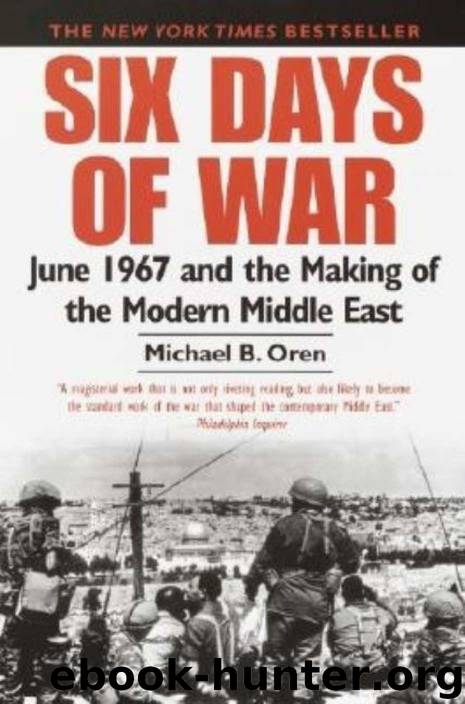Six Days of War: June 1967 and the Making of the Modern Middle East by Michael Oren

Author:Michael Oren
Language: eng
Format: mobi
Tags: history
ISBN: 9780795311857
Publisher: RosettaBooks
Published: 2010-07-01T04:00:00+00:00
Damascus and Jerusalem
The Syrian shelling of Israel’s northern settlements, unabated since the previous day, went largely unanswered. Residents of those settlements, comprising the country’s largest lobbying group, continued to pressure the government to act, their cause championed by Labor Minister Yigal Allon. Oxford alumnus, elite forces’ commander, and hero of the 1948 campaign against Egypt, the forty-nine-year-old Allon had promised the farmers that the war would not end with Syria’s guns still trained on them.
In promoting an operation to eliminate those guns, Allon could count on at least implicit support from Eshkol. The former Galilee farmer and water expert, Eshkol had deep sympathy for the northern settlers—and an abiding interest in the Jordan headwaters. “From the moment war broke out, Eshkol showed special apprehension regarding the north,” recollected Col. Lior, “In every consultation and every discussion … he would ask three or four times, ‘what’s happening up north?’ I think he went a little crazy with it … constantly bothering people about the Banias (one of the Jordan River sources). Twelve times a day, he’d ask: ‘What about the Banias?’”
But not all Eshkol’s ministers shared his Golan obsession. Zalman Aran and Haim Moshe Shapira, among others, still feared the opening of yet another front and possible intervention by the Soviets, and in this they had a powerful ally in Dayan.
The defense minister also expressed anxiety about the Russians, and doubted whether the Northern Command, already committed on the West Bank, had the troops necessary to take the Golan. In conversations with the Cabinet ministers, he dismissed the strategic threat posed by Syria. “We’re afraid of the Egyptians, even though they’re far away, because they’re very strong, and we’re afraid of the Jordanians, though they’re weak, because they’re very close. But the Syrians are weak and far away—there’s no immediate need to attack them.”
But along with strategic considerations, Dayan was also guided by a political interest in safeguarding his exclusivity over all military decisions. “Don’t interfere with security matters,” he warned Allon and the other ministers— Galili, Carmel—in favor of capturing the Golan. “In security matters there’s no democracy. If you try to interfere, I’ll quit.” Dayan would sanction only minimal action in the north: occupation of the Demilitarized Zones and, possibly, of the Banias springs. Yet he told Ben-Gurion confidentially that the Syrians’ “recklessness” was insufferable. Once the other fronts were decided, he said, Syria’s turn would come.23
Dayan’s position was predicated on maintaining an acceptable level of violence in the north, but at 2:00 A.M. on the morning of June 6, that assumption was substantively challenged. A massive artillery barrage fell from Kibbutz Dan and Kfar Szold at the tip of the Hula Valley to Ein Gev on the southern shores of Galilee. As many as 265 guns rained an estimated forty-five tons of ordnance per minute on the settlements; nearly a thousand shells pummeled the town of Rosh Pina alone. In an effort to deflect the Syrian fire, IDF engineers ignited barrels of smoke along the border, but the tactic proved only partially effective.
Download
This site does not store any files on its server. We only index and link to content provided by other sites. Please contact the content providers to delete copyright contents if any and email us, we'll remove relevant links or contents immediately.
| Africa | Americas |
| Arctic & Antarctica | Asia |
| Australia & Oceania | Europe |
| Middle East | Russia |
| United States | World |
| Ancient Civilizations | Military |
| Historical Study & Educational Resources |
Empire of the Sikhs by Patwant Singh(22163)
The Wind in My Hair by Masih Alinejad(4420)
The Templars by Dan Jones(4181)
Rise and Kill First by Ronen Bergman(4008)
The Rape of Nanking by Iris Chang(3508)
12 Strong by Doug Stanton(3052)
Blood and Sand by Alex Von Tunzelmann(2606)
The History of Jihad: From Muhammad to ISIS by Spencer Robert(2203)
Babylon's Ark by Lawrence Anthony(2066)
No Room for Small Dreams by Shimon Peres(1986)
The Turkish Psychedelic Explosion by Daniel Spicer(1986)
Gideon's Spies: The Secret History of the Mossad by Gordon Thomas(1946)
Inside the Middle East by Avi Melamed(1937)
The First Muslim The Story of Muhammad by Lesley Hazleton(1880)
Arabs by Eugene Rogan(1833)
Bus on Jaffa Road by Mike Kelly(1781)
Come, Tell Me How You Live by Mallowan Agatha Christie(1764)
Kabul 1841-42: Battle Story by Edmund Yorke(1648)
Citizen Strangers by Robinson Shira N.;(1534)
